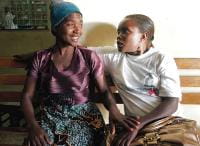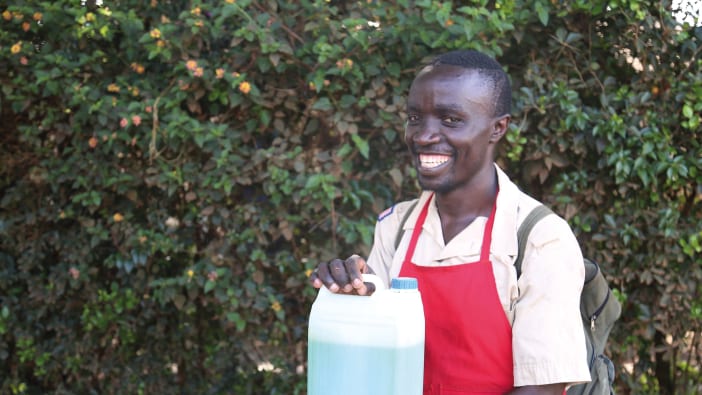Selina David (not her real name) is a patient with tongue cancer in Geita district, Tanzania. She is also HIV positive which makes her more vulnerable to diseases like cancer. She very kindly gave this interview to Mary Makalanga, a Palliative Care Coordinator who works in partnership with Tearfund.
How did you find out that you had cancer?
Firstly I was diagnosed as being HIV positive. Some time later my tongue developed fungus and it was hard to eat. After a short period of time the tongue started to swell until it filled my mouth. I developed some le-sions, like small abscesses, on my upper eye-lids and all over my face. Eventually I went to Ocean Road Cancer Institute in Tanzania where they told me I had cancer of the tongue. I received some medicine to reduce the swelling and returned back home to wait.
What has been the biggest challenge of having cancer?
The biggest challenge I faced was severe pain and dependency, because I was unable to work due to the pain. I just lay down, day and night. I have three children who stay with my mother in another village. Be-fore I was ill, I was the only one who was working and providing the family with daily bread and other basic needs. When I was sick and useless, I couldn’t do anything. I was just waiting to die. Things were also very difficult at my brother’s house where I was staying. There was not enough food or other basics. My brother and his wife were also HIV positive, though still healthy. I found it discouraging. Because of my condition, I was in need of nutritional support and I was deteriorating. I knew in my heart that if nobody came to rescue me, I would die very soon.
What support have you received? Who gave you this support? And how has this helped you?
One day a team of five home-based care volunteers from the African Inland Church of Tanzania came to me in the name of God. They talked to me and listened to my story. The team told me about a new service known as palliative care and gave me some medical support, including drugs to reduce pain. They read the Bible and prayed with me. From then on the team continued to support me and my family with food and antiretroviral drugs [medicine which helps to slow the progression of HIV/AIDS]. Soon I got my peace of mind back and I felt more secure and comfortable than when I was in severe pain in the past. The swelling in my tongue slowly disappeared. My hope to survive has been restored again and I have good palliative care volunteers who visit me regularly, pray and talk with me. They care so much for me and I feel like a human being again.
What is your advice to other people who are suffering from cancer?
My advice is to make sure you tell other people within your community about your condition as early as possible because then people can help and support you, particularly if you also have HIV. There are health workers and other volunteering groups who can help you to really understand what is going on. This is better than going to traditional or witch doctors, which can result in more pain, complications and new infec-tions. With health workers you are safe because their medicine helps to reduce pain. With the support of skilled people from the palliative care group, a patient can become more psychologically, emotionally, spiritually and physically well. As for me, I now feel a lot less pain.










